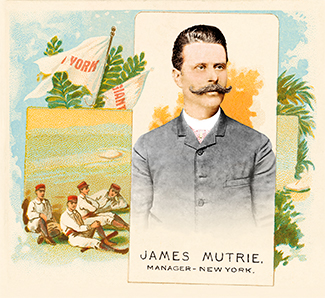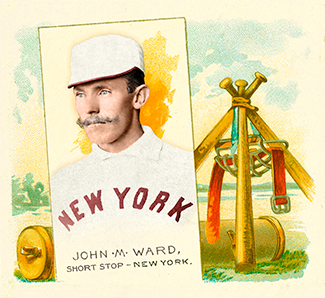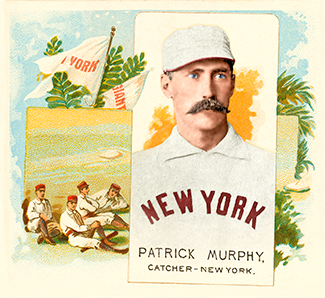- Series: 1888 Champion New York Giants
- City: New York
- Team: Giants
- League: National League
- Hall: National Baseball Hall of Fame
“Monte” Ward (1860-1925). An elite pitcher and an excellent batsman, Ward also earned a law degree, formed sports’ first labor union, and helped create the Player’s League to challenge the reserve clause – all before the age of 30.
- 3x National League Pennant winner
- Only player: 100 wins/2,000 hits
- Pitched 2nd perfect game in history, June 17, 1880
- Elected to Hall of Fame: 1964
- Series: 1888 Champion New York Giants
- City: New York
- Team: Giants
- League: National League
Patrick J. Murphy (1857-1927) was a right-handed catcher for the New York Giants from 1887-1990. This Massachusetts native had a career batting average of .220 and hit one home run in the “Dead Ball” era. He played in one “world series” in 1888, going one for 10 and scoring a run in three games against the St Louis Browns. The Giants prevailed six games to four. The contest was marked by the great future Hall of Famer Tim Keefe’s four victories over the Browns.
- Murphy was a grizzled 30 years of age when he broke in with the Giants
- Murphy’s sole hit in the ’88 series was good for an RBI
- In 1889 Murphy’s salary was $1800

- Series: 1888 Champion New York Giants
- City: New York
- Team: Giants
- League: National League
James J. Mutrie (1851-1938) was a giant among early baseball entrepreneurs. He may rightly be known as the father of New York baseball, is second only to Joe McCarthy in manager winning %, won pennants in two leagues, helped create (and won) the first true inter-league run-up to the “world series” and popularized the nickname for his Manhattan “Gothams” by referring to his burly lads as “my Giants!” Along the way, “Truthful James” (a wry sobriquet given by the immortal Father Henry Chadwick) stirred controversy at nearly every turn, risked all and in the end, lost. Yet he was beloved by his players and for decades was revered in the Big Apple as the man who truly brought the game to its biggest stage. He and partner John Day audaciously brought two new NY entries into the city: the AA’s Metropolitans and what would become the National League’s Polo Grounds-dwelling Giants who triumphed in the first two post-season tournaments. Done in by the Players’ League rebellion and ensuing financial pressures, Mutrie was forced from the game in 1892.
- Mutrie prospered by raiding AA players for his NY club and paid the price when his top talent defected a decade later to the PL


